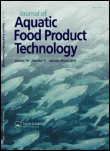
Journal of Aquatic Food Product Technology
Scope & Guideline
Pioneering research for safer, sustainable aquatic food products.
Introduction
Aims and Scopes
- Aquatic Food Processing Technologies:
Research on innovative processing methods for aquatic food products, including thermal, non-thermal, and preservation technologies that enhance product safety and quality. - Quality Assessment and Enhancement:
Studies focused on evaluating and improving the sensory, nutritional, and microbiological qualities of aquatic foods through various interventions and processing techniques. - Biochemical and Nutritional Studies:
Investigations into the biochemical composition, nutritional value, and health benefits of various aquatic species and their by-products. - Utilization of By-products:
Research on the valorization of waste and by-products from the seafood industry, focusing on their potential applications in food products and other industries. - Food Safety and Microbiology:
Studies addressing food safety issues, including microbial contamination, spoilage mechanisms, and the application of preservatives and natural extracts to enhance food safety. - Functional Ingredients and Additives:
Research exploring the incorporation of functional ingredients, such as bioactive compounds from marine sources, into food products to enhance health benefits. - Sustainability in Aquaculture and Fisheries:
Investigations aimed at promoting sustainable practices in aquaculture and fisheries, including the impact of environmental factors on aquatic food quality.
Trending and Emerging
- Innovative Processing Technologies:
There is a growing trend in research focusing on innovative processing technologies such as ultrasound, high-pressure processing, and other non-thermal methods that improve product quality and safety. - Bioactive Compounds and Functional Foods:
An increasing emphasis on the extraction and application of bioactive compounds from aquatic sources, aiming to develop functional foods that promote health and well-being. - Sustainability and Eco-friendly Practices:
Research addressing sustainable practices in aquaculture and fisheries is on the rise, with a focus on minimizing environmental impact and promoting responsible sourcing. - Food Safety Innovations:
Emerging studies are increasingly focused on novel methods for ensuring food safety, including the use of natural preservatives and advanced detection techniques for contaminants. - Nutritional Enhancement of Aquatic Products:
There is a notable trend towards enhancing the nutritional profiles of aquatic products through fortification with functional ingredients, reflecting a growing consumer demand for health-oriented food options. - Utilization of Marine Resources:
Research exploring the potential of underutilized marine species and by-products is gaining traction, highlighting the importance of resource efficiency and waste reduction in the seafood industry.
Declining or Waning
- Traditional Preservation Methods:
There is a noticeable decline in research focused on traditional preservation methods such as salting and smoking, likely due to the growing interest in modern, innovative preservation techniques that offer better quality and safety. - General Aquatic Species Studies:
Research that broadly addresses aquatic species without specific applications or technological advancements is waning, as the journal emphasizes more targeted studies that contribute to processing and product development. - Heavy Metal and Contaminant Studies:
While still relevant, there is a reduced frequency of studies specifically targeting heavy metals and contaminants in aquatic foods, possibly due to the increased regulatory measures and improved practices in seafood safety. - Historical and Cultural Aspects of Aquatic Foods:
Research that focuses on historical, cultural, or traditional aspects of aquatic food consumption is becoming less prominent, as the journal shifts towards more scientific and technological contributions.
Similar Journals
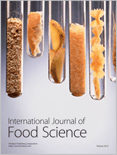
International Journal of Food Science
Connecting Researchers to Transform Food PracticesThe International Journal of Food Science, published by HINDAWI LTD, stands as a crucial platform for advancing knowledge within the realm of food science. Established in 2013, this Open Access journal based in Egypt has garnered significant recognition, achieving an impressive Q2 classification in the 2023 Food Science category, which reflects its commitment to quality and impactful research. With a Scopus rank of #88 out of 389 in Agricultural and Biological Sciences and placing in the 77th percentile, this journal serves as an essential resource for researchers, professionals, and students dedicated to innovative developments and scientific exploration in food science. The journal not only provides unrestricted access to valuable research but also aims to foster collaboration and dissemination of knowledge on critical issues affecting food safety, nutrition, and technology. For those looking to keep abreast of the latest advancements, the International Journal of Food Science is certainly an indispensable addition to their academic pursuits.

Journal of Food Science and Technology-Ukraine
Advancing Food Innovation for a Sustainable FutureJournal of Food Science and Technology-Ukraine, published by the Odesa National University of Technology, stands as a pivotal platform dedicated to the dissemination of high-quality research in the field of food science and technology. With its open access policy established in 2014, the journal fosters global knowledge sharing and accessibility, enabling researchers, professionals, and students to access critical findings and advancements in food technology without barriers. The journal's commitment to publishing innovative studies, reviews, and case analyses reinforces its role in addressing contemporary challenges in food safety, preservation, processing, and nutritional quality. With ISSN 2073-8684 and E-ISSN 2409-7004, it serves as a valuable resource for the academic community, supporting the advancement of food science knowledge and its practical applications.

COMPREHENSIVE REVIEWS IN FOOD SCIENCE AND FOOD SAFETY
Unveiling Insights in Food Science and SafetyCOMPREHENSIVE REVIEWS IN FOOD SCIENCE AND FOOD SAFETY, published by Wiley, is a premier journal dedicated to advancing the understanding of food science and safety through thorough and critical reviews. With an impressive Q1 ranking in the field of Food Science and a notable Scopus ranking of #4 out of 389 in Agricultural and Biological Sciences, this journal occupies a vital position within the academic community. Its rigorous approach to publishing comprehensive reviews serves as an invaluable resource for researchers, professionals, and students aiming to stay abreast of current trends and advancements in the food sector. Although the journal does not offer open access options, its contributions from 2002 through 2024 reflect a commitment to high-quality scholarship and knowledge dissemination. Researchers looking to elevate their understanding of food safety and related disciplines will find this journal an essential addition to their academic repertoire.

JOURNAL OF THE JAPANESE SOCIETY FOR FOOD SCIENCE AND TECHNOLOGY-NIPPON SHOKUHIN KAGAKU KOGAKU KAISHI
Exploring the Frontiers of Food Science in JapanWelcome to the JOURNAL OF THE JAPANESE SOCIETY FOR FOOD SCIENCE AND TECHNOLOGY-NIPPON SHOKUHIN KAGAKU KOGAKU KAISHI, a pivotal platform for the advancement of food science and technology. Published by the Japan Society for Food Science and Technology, this esteemed journal has been contributing to the field since 1995 and continues to publish innovative research and reviews that foster knowledge and collaboration among researchers, professionals, and students interested in food science. Although it currently holds a Q4 ranking within the Food Science category, the journal's commitment to disseminating valuable insights showcases its potential as a resource for emerging trends and applications in food technology. While it does not offer open access options, it maintains a rigorous peer-review process to ensure the quality of its content. As this journal progresses into its convergence years through 2024, it remains an essential resource for those passionate about exploring the intersections of food science and technology in Japan and beyond.
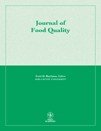
JOURNAL OF FOOD QUALITY
Elevating Food Science through Quality ResearchThe Journal of Food Quality, an esteemed publication under Wiley-Hindawi, stands as a vital resource in the dynamic field of Food Science, established since 1977 and operating under an Open Access model since 2017. With its seat in the United Kingdom, this journal focuses on delivering high-quality research and insights pertaining to food safety, risk management, and quality assurance, reflected in its impressive Q2 ranking in both Food Science and Safety, Risk, Reliability and Quality categories in 2023. Researchers and professionals will find the journal’s contributions indispensable, particularly given its Scopus rankings that place it in the top echelons of its fields, highlighting its impact and relevance. By fostering an environment of knowledge sharing, the Journal of Food Quality not only enhances academic dialogue but also supports innovation and best practices in food research and industry applications.
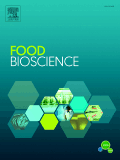
Food Bioscience
Advancing the Frontiers of Food Science and BiosciencesFood Bioscience is a leading peer-reviewed journal published by Elsevier, dedicated to advancing the understanding of the complex interplay between food science and biosciences. With an impressive Impact Factor that places it in the Q1 and Q2 quartiles for Food Science and Biochemistry respectively, the journal consistently ranks among the top publications in its field, reflected in its Scopus rankings (Rank #83/389 in Food Science and Rank #175/438 in Biochemistry). Since its inception in 2013, Food Bioscience has fostered a multidisciplinary approach, bridging gaps between research in agricultural, biological, and food sciences, thus encouraging innovative solutions to the pressing challenges facing the global food supply chain. Although it currently operates under a subscription model, the journal is committed to disseminating high-quality research, making significant contributions to both academic scholarship and industry practices. Researchers, professionals, and students alike are invited to explore the wealth of knowledge contained within its pages as it plays a pivotal role in shaping the future of food bioscience.

International Food Research Journal
Advancing Food Science Through Innovative ResearchThe International Food Research Journal, published by UNIV PUTRA MALAYSIA PRESS, serves as a pivotal platform for disseminating innovative research within the field of food science. With an ISSN of 1985-4668 and an E-ISSN of 2231-7546, the journal has successfully established its presence since its inception in 2007, converging its findings through 2024. This esteemed journal holds a Q3 ranking in Food Science, illustrating its valuable contributions to the field as demonstrated by its Scopus rank of 276 out of 389, placing it in the 29th percentile among its peers in Agricultural and Biological Sciences. Although it operates under a traditional publishing model, its academic integrity and focus on high-quality research ensure that it remains a vital resource for researchers, professionals, and students eager to explore advances in food technology, nutrition, and safety. By encouraging interdisciplinary collaboration and critical dialogue, the International Food Research Journal plays an essential role in shaping the future of food science research.
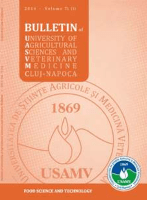
Bulletin of University of Agricultural Sciences and Veterinary Medicine Cluj-Napoca-Food Science and Technology
Transforming Research into Real-World Solutions in Food ScienceBulletin of University of Agricultural Sciences and Veterinary Medicine Cluj-Napoca - Food Science and Technology is a prominent peer-reviewed journal dedicated to advancing the field of food science and technology. Published by the University of Agricultural Sciences and Veterinary Medicine Cluj-Napoca, this open-access journal has been serving the academic community since 2013, promoting the dissemination of high-quality research that addresses pressing issues in food safety, quality, and innovation. With its ISSN 2344-2344 and E-ISSN 2344-5300, the journal aims to bridge the gap between academia and industry by providing a platform for scholars and practitioners to share their findings, insights, and methodologies. Situated in the heart of Romania, the journal reflects the country's rich agricultural heritage and its commitment to enhancing global food systems. By maintaining a rigorous editorial standard, the Bulletin ensures that it remains a vital resource for researchers, industry professionals, and students who are keen to explore the latest developments in food science.

Foods
Uniting Disciplines for Comprehensive Food Insights.Foods is a premier open access journal published by MDPI, based in Switzerland, that has been at the forefront of disseminating high-quality research in the fields of food science, health professions, and plant science since its establishment in 2012. With an impressive convergence of interdisciplinary studies spanning various aspects of food, nutrition, and microbiology, the journal aims to provide a comprehensive platform for researchers and professionals to share innovative ideas and findings. Maintained as a Q1 journal in multiple categories for 2023, including Food Science and Health Professions, Foods has garnered significant recognition within the academic community, reflected in its strong Scopus rankings and percentiles across various disciplines. The journal not only promotes open access to enhance the visibility and accessibility of research but also encourages the exploration of sustainable food systems and health-related issues, thus contributing to essential discussions in today's society. For those looking to advance their understanding and expertise in food-related sciences, Foods serves as an enduring resource for groundbreaking studies and critical insights.

Acta Scientiarum Polonorum-Technologia Alimentaria
Exploring the Future of Food TechnologyActa Scientiarum Polonorum-Technologia Alimentaria, published by Poznan University of Life Sciences, is a revered journal in the field of food science, showcasing cutting-edge research and innovations in food technology. Established as a leading platform within its domain, this journal is indexed under Scopus and ranks in the 2023 Q3 quartile for Food Science, demonstrating its commitment to high-quality scholarship. With an ISSN of 1644-0730 and E-ISSN 1898-9594, it serves as a critical resource for researchers, professionals, and students seeking to stay at the forefront of advancements in food safety, quality control, and sustainable practices. The journal has also been recognized for its contributions to the agricultural and biological sciences, positioning itself at rank #205 out of 389 in this competitive field. While currently not offering open access, the journal's valuable insights and findings, especially as it publishes through 2024, play a crucial role in advancing knowledge and fostering collaboration among experts in the food science sector.